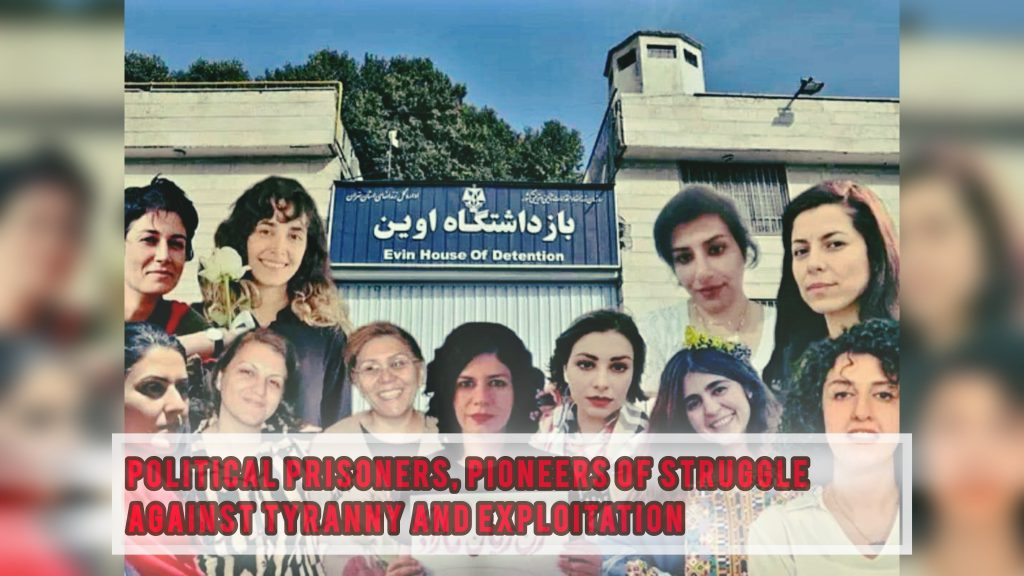
On Tuesday, July 9, 2024, sixteen female political prisoners condemned the death sentence of Sharifeh Mohammadi, a well-known and free-spirited labor activist, in an open letter. They emphasized their solidarity with all those at risk of execution and demanded the abolition of the death penalty. They wrote, “This is not just Sharifeh’s death sentence but a sentence for all of us labor, political, civil, human rights, and women’s rights activists. We see this sentence as a potential threat and a prelude to issuing heavier sentences in the future.”
Among these political prisoners, who have raised the flag of resistance in prisons, are familiar names such as Sepideh Qoliyan, Golrokh Iraee, Narges Mohammadi, and Anisha Asadollahi. These brave women have long fought against the prevailing reactionary and tyrannical forces, fearlessly defending the trampled rights of the majority of society. This letter coincides with a statement from political prisoners involved in the “Tuesdays Against Execution” campaign. In their statement, they described the non-participation of most citizens in the Islamic Republic’s elections to determine Raisi’s successor as “delegitimizing the rule of the Supreme Leader” and condemned the “shameless” issuance of the death sentence for labor activist Sharifeh Mohammadi. They announced that they would go on a hunger strike on Tuesday in nine prisons, including Evin (women’s wards 4, 6, and 8), Ghezel Hesar (units 3 and 4), Khorramabad, Karaj Central, Tabriz, Khoy, Naqadeh, Saqqez, and Mashhad.
Political prisoners in the Islamic Republic have not only actively fought against the death penalty but have also opposed the regime’s actions and policies in other fields. They played a significant role in boycotting the recent elections held by the Islamic government. In this regard, political prisoners in 38 prisons issued statements urging people, especially the youth, to boycott the regime’s elections and refrain from going to the polls. They reminded that participating in the elections only prolongs the life of a disgraceful regime responsible for the deaths of tens of thousands of passionate individuals and turning a wealthy nation into a poor country. Among these political prisoners, the addresses of several individuals had a significant impact on the election boycott. On June 23, Sepideh Qoliyan wrote to citizens, stating that not voting is a form of civil resistance against oppression. She wrote, “Civil resistance through not voting must be active and aimed at advancing the revolutionary movement of ‘Women, Life, Freedom.’ This is only possible by maintaining social solidarity among various groups and politically representing it to achieve real democracy and freedom in Iran.”
Golrokh Iraee, in her message regarding the boycott of the election to choose Raisi’s successor, addressed the reformists, saying: “Reformists should know that we, the people of Iran, remember their betrayal from the very beginning. We do not forget the consolidation of the Islamic Republic’s power and the catastrophic massacre of young people in the 1980s; in the days when you Hezbollahis and Imam’s line followers were at the helm.” She further reminded: “We do not forget the cultural revolution, the expulsion and house arrest of students and professors; prioritizing ignorance over merit; the massacres, torture, rape, forced confessions, and compelling political prisoners to execute their comrades in the 1980s; and the chain murders carried out by you and your subordinates in the Ministry of Intelligence.”
Narges Mohammadi, a human rights activist and Nobel Peace Prize laureate, announced in a statement from Evin Prison on June 22 that she would not participate in the presidential election. She emphasized that the only goal of the Islamic Republic government in holding another election is to “consolidate its power and tyranny” and wrote, “I will not participate in the illegal elections of the repressive and illegitimate government.
” According to this renowned human rights activist, the only aim of holding elections by a government that believes in suppression, fear, and violence as the sole means of maintaining power is not to uphold democracy and the people’s rights but to strengthen power and tyranny.
The resistance actions of political prisoners, especially imprisoned women, are of particular importance in these days when the regime has intensified arrests and fabricated cases against labor activists. These prisoners, who draw strength from the revolutionary atmosphere of society, in turn, reinforce the resistance spirit in the community. They are today the barometers of the resistance atmosphere in society and will play a pioneering role when the prison doors are broken tomorrow.

